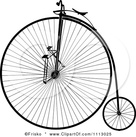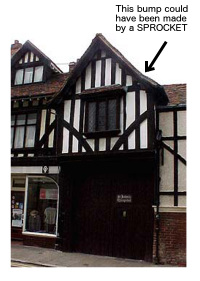\ˈsprä-kət\
Time for some fun historical facts!
There’s one thing about attaching your pedals to the wheel, though: if you want to go faster you have to pedal faster. And while that is pretty straightforward most people can only pedal so fast. If you want to go faster than that you have to cover more ground with each turn of the pedal—which means you have to make the wheel bigger. And since a significant subset of cyclists, then as now, are gonzo maniacs, the result was a thrill-seeker arms race as bike manufacturers tried to get more speed and more thrills out of their designs.
Until about 1876, when a smart fella marketed the first “safety” bicycle, which used a chain drive to transfer the power of the pedals to a nice, manageably sized rear wheel. By means of (yes!) our friend the SPROCKET.
Once there was a sprocket, people started playing around with it. It’s easier to pedal when the rear wheel sprocket is big. On the other hand, if you want to go super fast and don’t mind working harder, you’d go for a small sprocket. But how to deal with hills and headwinds and such? For a while racing bikes had a large sprocket on one side of the rear wheel and a smaller one on the other side. So to change gears, the rider had to stop, remove the wheel, turn it around so the other sprocket engaged with the chain, and then reattach the wheel. Which, in the middle of a race, tends to slow a person down.
Eventually another smart fella figured out that this was really kind of stupid: what you need is sprockets of several different sizes all mounted on the SAME side of the wheel, plus a way of moving the chain from one to another. Something that would … de-rail … the chain off one sprocket and settle it onto another. Being French, he called cette petite chose a dérailleur and then repaired to a café for some cheese and a nice glass of Armagnac.
But back to the sprocket. Which is not a French word at all. In fact it is redolent with good old Anglo-Saxon vigor.
No one seems to know its precise origin. According to the Oxford English Dictionary, the word first appeared in English in the year 1536, in the account books of St. John’s Hospital in Canterbury, viz:
| It turns out that St. John’s Hospital in Canterbury is still there! Check out the little dip-and-flare in the gatehouse roof—that’s the sort of thing you would do with the aid of some sprockets. It took another 200 years for the protrusions of the roofer’s sprocket to morph into the protrusions we see today on capstans and chainsaws and film strips—and bicycle drive trains. |
Thus proving that bicycles and beer have gone together since the VERY beginning.
You read it here first.




 RSS Feed
RSS Feed